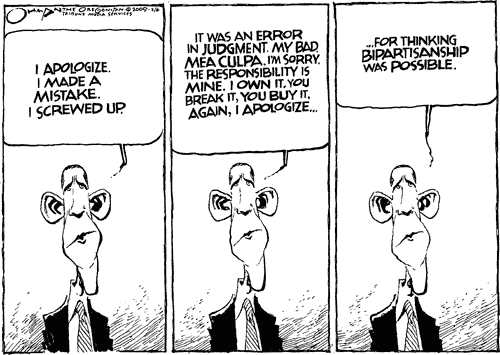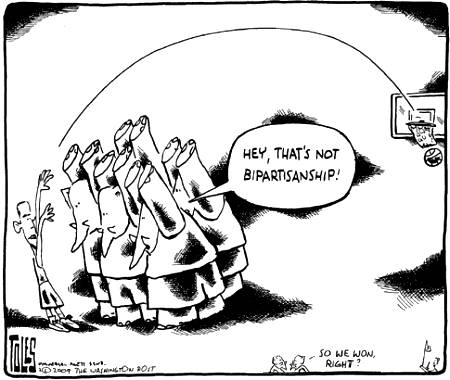
Tuesday, February 17, 2009
Pirate Bay Trial: The Hottest Ticket in Stockholm


Special correspondent Oscar Swartz reports.
STOCKHOLM -- Today I bought a scalped seat in a court of justice for the first time in my life. The Pirate Bay courtroom was full. But locally famous Swedish author Sigge Eklund whispered in my ear that he had an offer for three seats after the intermission. The price would be about $60 each. We met in a corner of the hallway and finalized the transaction with three young men who were leaving. I was in! This pretty much captures the rock-star quality of The Pirate Bay trial.
To convict the four defendants, the prosecutor has to prove that copyright infringements have actually been committed in the first place -- not just as conjecture, but in real cases where the proof will hold up in a court of justice. So he had instructed the plaintiffs, i.e. representatives of record, film and computer-game companies, to participate in file-sharing activities and collect and store information about the whole process in order to prove that crimes were committed.
Half the first day of the trial was used in such exercises, as opening arguments commenced Monday. But few in the audience seemed to display much sympathy for the plaintiffs as they heard stories like: "eleven users were simultaneously involved in producing illegal copies of Let it Be by The Beatles, hence infringing on the exclusive right of EMI to produce such."
Few believe that the defendants in The Pirate Bay case will face particularly harsh penalties in the criminal lawsuit even if they are convicted. Theoretically they could end up in jail, but they are not accused of committing copyright infringement. Instead their criminality is alleged to be indirect: "Assisting in and preparing to committing copyright infringement." But it is more difficult, both legally and politically, to go after the "real" infringers: the Pirate Bay's claimed 22 million strong users.
In the defendants' opening statements, they denied any criminal acts, though Fredrik Neij and Gottfrid Svartholm Warg conceded responsibility for certain functions in running The Pirate Bay. Peter Sunde claimed he had no overall responsibility, while the older Carl Lundstrom claimed he only sold co-location and bandwidth to the operation at market prices.
Media interest is intense. The largest Swedish newspapers have bloggers covering the trial live as the top front page story. Public radio and TV have special sites and have broadcast the audio from the courtroom in its entirety. Crowds of Pirate Party and Pirate Bureau members were circling the court, inside and outside. Your correspondent was served homemade "Creative Commons cookies" by teenage girls in fantasy genre garb. They said they wanted to support the good forces of the world and convert bad ones to their cause.
Perhaps recognizing that public opinion was against him, the prosecutor painted a somewhat benevolent picture of the Defendants during his opening statement, telling a story about some very gifted computer nerds who started an ideologically-based project that grew larger, and began needing more resources to keep up with its popularity. Hence, The Pirate Bay started selling ads on the site, and became more organized. The defendants didn't deny any of this, but claimed that the advertising income just covered part of their expenses for running and developing their heavily trafficked site.
The prosecutor claimed the gross revenue to their operations amounted to the equivalent of $150,000 before the raid in May 2006. He asks that this amount, as well as a lot of servers and equipment, be forfeited, in addition to sentencing the defendants to fines and jail time. Most in the crowd seemed to disagree.
http://blog.wired.com/27bstroke6/2009/02/pirate-bay-tria.html
Tomgram: William Astore, Whose Military Is It Anyway?
According to the New York Times, suicides in the U.S. Army this January alone could total as many as 24. (For January 2008, the number was five.) If so, that would not only be the highest monthly total since the Army started keeping such figures in 1980, but more deaths than occurred in Iraq and Afghanistan combined that month. In 2008 as a whole, at least 128 soldiers killed themselves. As the Times noted, "Suicides… rose for the fourth year in a row, reaching the highest level in nearly three decades. Army officials say the stress of long deployments to war zones plays a role in the increase."
Mark Benjamin and Michael de Yoanna, who have just completed a major multi-part examination of Army suicides at Salon.com, record this official reaction to the military health crisis: "'Why do the numbers keep going up?' Army Secretary Pete Geren said at a Pentagon news conference Jan. 29. 'We can't tell you.' The Army announced a $50 million study to figure it out." The two reporters find a wealth of evidence of military misdiagnosis, mistreatment, and plain, outright lack of desire to face a plague of suicides. ("At Fort Carson," the base they studied, "a mental problem from combat is still a scarlet letter.")
But above all, of course, there are simply those endlessly repeated tours of duty in the Afghan and Iraq war zones. Suicides, in this sense, can be thought of as the individual symptoms of a larger military disease. In these last years, the U.S. military has been, like the individuals who committed suicide, overstrained, overstressed, and made to fight wars that consumed America's treasure, while becoming ever more unpopular at home. As retired Air Force Lieutenant Colonel and TomDispatch regular William Astore points out below, despite all the lovely "support our troops" sentiments in the U.S., the military was essentially abandoned to its stresses abroad and so became, in practical terms, ever more "foreign" to Americans.
While the Army struggles, not particularly effectively, to deal with its suicide problem, political and military leaders struggle no less unimpressively to deal with the larger problems of military stress. Their unanimous solution to the global policy version of post-traumatic stress disorder: Cut down on those tours of duty and repair the military by significantly expanding U.S. forces. The obvious response, the one that could bring the military back to a state of health, is of course roundly ignored: Downsize the global mission. Bring American troops home. Tom
An American Foreign Legion
Is the U.S. Military Now an Imperial Police Force?
By William AstoreA leaner, meaner, higher tech force -- that was what George W. Bush and his Secretary of Defense Donald Rumsfeld promised to transform the American military into. Instead, they came close to turning it into a foreign legion. Foreign as in being constantly deployed overseas on imperial errands; foreign as in being ever more reliant on private military contractors; foreign as in being increasingly segregated from the elites that profit most from its actions, yet serve the least in its ranks.
Now would be a good time for President Barack Obama and Secretary of Defense Robert Gates to begin to reclaim that military for its proper purpose: to support and defend the Constitution of the United States against all enemies, foreign and domestic. Now would be a good time to ask exactly why, and for whom, our troops are currently fighting and dying in the urban jungles of Iraq and the hostile hills of Afghanistan.
http://www.tomdispatch.com/post/175034
Sphere: Related ContentFormer MI5 chief: Government exploits terror fears to restrict civil liberties
Stella Rimington attacks British and American leadership over surveillance and alleged torture techniques
by Matthew Weaver
"It would be better that the government recognised that there are risks rather than frightening people in order to be able to pass laws which restrict civil liberties, [which is] precisely one of the objects of terrorism: that we live in fear and under a police state," she told La Vanguardia.
Rimington, who stood down as the British security service's director general in 1996, also accused the US of torture.
"The US has gone too far with Guantánamo and the tortures. MI5 does not do that," she said.
Her comments came as a court heard that MI5 lawyers were involved in devising a policy governing the interrogation of terrorism suspects in Pakistan that led to the torture of British citizens and residents. The policy emerged during the cross-examination of an MI5 officer who had questioned Binyam Mohamed, the British resident held in Guantánamo Bay.
They also coincided with a report by the International Commission of Jurists, which singled out the UK for complicity in torture and abusive counterterrorism laws.
In her interview Rimington said: "Since I have retired I feel more at liberty to be against certain decisions of the government, especially the attempt to pass laws which interfere with people's privacy."
http://www.guardian.co.uk/uk/2009/feb/17/government-exploiting-terrorism-fear
What's So Bad About a Banker Brain Drain?
by Gerald Epstein
 Wall Street warns that limits on executive pay may cause a brain-drain from mega banks. (Photo: Reuters)
Wall Street warns that limits on executive pay may cause a brain-drain from mega banks. (Photo: Reuters)
The Financial Times reports that U.S. bankers are "enraged" about the pay limitations of the new U.S. recovery plan. Numerous bankers warn that these pay caps will lead to a "brain drain": high paid bankers will flee elsewhere in search of the top dollar.
Should we be quaking in our boots about this threatened drain of bankers' brains?
I don't think so.
For starters, this may simply be an idle threat. There are a lot of questions about how many bankers will really be affected by these pay limitations. And even if they do want to leave, the bankers may not be able to make good on their threat. Anti-banker anger is on the rise just about everywhere and pay caps are being imposed in many of the world's financial centers including London and Paris, and are likely to be instituted elsewhere as well. Bankers in other financial centers simply do not receive the huge salaries and bonuses received by "top" U.S. bankers in recent years. In addition, bankers in other countries, including high priced ones, are losing their jobs. So, where are these angry U.S. bankers going to go?
One answer is they will go to the unregulated "shadow" banking sector: hedge funds, private equity firms and the like. Of course, these are also under enormous stress. And if the Obama administration is going to prevent another crisis down the road, it will have to start seriously regulating this "shadow" system, including their compensation schemes.
But, let's take bankers at their word. Let's say many of the "best minds in banking" will go elsewhere if serious pay restrictions are imposed. The question we have to ask is: so what? The answer is: this may be a blessing in not that much of a disguise.
GOP Instantaneously Solves World's Problems
 by eriposte
by eriposte Are you depressed because of the bad economy and the ongoing conflicts across the world? Are you unhappy with your current job? Do you have intractable problems in your personal life?
Are you a shopaholic headed to a confessional? Are you concerned that you don't have someone to read you old novels and books when you are bored? Are you finding that the person you consider your significant other is just not that into you? Are you worried about how to address corruption at the top levels of financial institutions across the world? Does your car need an oil change?
Well, worry no more. The GOP is here to solve all of your problems. Just go to:
If you feel the solution offered by the website doesn't help you, make sure you click on the link "That doesn't make sense" to see what GOP Problem Solver has to offer you.
Tastiest Obama-Lincoln Comparison Ever
By Ashley Southall AND Janie Lorber
 Zilly Rosen, a pastry artist in Buffalo, took her treats to Washington this weekend, constructing side-by-side portraits of Barack Obama and Abraham Lincoln using more than 5,600 cupcakes.
Zilly Rosen, a pastry artist in Buffalo, took her treats to Washington this weekend, constructing side-by-side portraits of Barack Obama and Abraham Lincoln using more than 5,600 cupcakes.But the edible exhibit, on display Saturday at the Smithsonian American Art Museum in honor of Lincoln's 200th birthday, had a short shelf life.
Just before 5 p.m., after a five-hour display period, the cupcakes started flying off the ground as salivating spectators devoured the mural from the outside in. Within minutes nearly all of Lincoln's face had disappeared. But an hour later — thanks to either full stomachs or a respect for the sitting president — the majority of Mr. Obama's face was left intact.
The mural had something for all tastes: Lincoln, on the right, was recreated in vanilla cupcakes with chocolate butter-cream frosting. Mr. Obama's likeness, on the left, was made out of chocolate cupcakes with vanilla butter-cream frosting. The stripes on the American flag backdrop were red velvet.
http://thecaucus.blogs.nytimes.com/2009/02/14/tastiest-obama-lincoln-comparison-ever/
Scientists celebrate dawn of Barack Obama's age of reason
by Mark Henderson
Opening on the 200th anniversary of Charles Darwin's birth, the 175th conference of the world's largest science society was always likely to have a celebratory feel to it.
There was indeed a palpable buzz yesterday in the subterranean conference rooms of the two downtown Chicago hotels where the American Association for the Advancement of Science (AAAS) is holding its annual meeting. The real excitement, however, has had much less to do with Darwin than with the most famous former resident of America's second city — Barack Obama.
This AAAS meeting has been a coming-out party for American scientists after eight years in which they have felt marginalised and ignored. Few sections of American society found George W. Bush's presidency quite as dispiriting as its scientists. From climate change to stem-cell research, the White House was at odds with researchers over virtually all the issues they most cared about.
President Obama has changed all that. With an extra $65 billion (£45 billion) promised for energy and research in his stimulus package, with new policies on global warming and stem cells, and above all with a list of appointments that includes some of the most glittering names in American science, he has transformed the mood of the nation's laboratories — and the mood of this conference.
Debates and lectures that would until recently have been ignored by the White House now stand a real chance of influencing policy. Al Gore, for example, was due to give the keynote address last night. The climate change campaigner and former Vice-President is an insider again now, and many scientists attending the AAAS conference are starting to consider themselves insiders too.
In his inaugural address, President Obama promised to "restore science to its rightful place". When announcing his science team, he said that "promoting science isn't just about providing resources — it's about protecting free and open inquiry. It's about ensuring that facts and evidence are never twisted or obscured by politics or ideology." US scientists feel that they finally have in Mr Obama a president who not only supports and values what they do, but who also understands them.
http://www.timesonline.co.uk/tol/news/uk/science/article5728204.ece
Former Gitmo Guard Tells All


By Scott Horton
Army Private Brandon Neely served as a prison guard at Guantánamo in the first years the facility was in operation. With the Bush Administration, and thus the threat of retaliation against him, now gone, Neely decided to step forward and tell his story. "The stuff I did and the stuff I saw was just wrong," he told the Associated Press. Neely describes the arrival of detainees in full sensory-deprivation garb, he details their sexual abuse by medical personnel, torture by other medical personnel, brutal beatings out of frustration, fear, and retribution, the first hunger strike and its causes, torturous shackling, positional torture, interference with religious practices and beliefs, verbal abuse, restriction of recreation, the behavior of mentally ill detainees, an isolation regime that was put in place for child-detainees, and his conversations with prisoners David Hicks and Rhuhel Ahmed. It makes for fascinating reading.
Neely's comprehensive account runs to roughly 15,000 words. It was compiled by law students at the University of California at Davis and can be accessed here. Three things struck me in reading through the account.
First, Neely and other guards had been trained to the U.S. military's traditional application of the Geneva Convention rules. They were put under great pressure to get rough with the prisoners and to violate the standards they learned. This placed the prison guards under unjustifiable mental stress and anxiety, and, as any person familiar with the vast psychological literature in the area (think of the Stanford Prison Experiment, for instance) would have anticipated produced abuses. Neely discusses at some length the notion of IRF (initial reaction force), a technique devised to brutalize or physically beat a detainee under the pretense that he required being physically subdued. The IRF approach was devised to use a perceived legal loophole in the prohibition on torture. Neely's testimony makes clear that IRF was understood by everyone, including the prison guards who applied it, as a subterfuge for beating and mistreating prisoners—and that it had nothing to do with the need to preserve discipline and order in the prison.
Second, there is a good deal of discussion of displays of contempt for Islam by the camp authorities, and also specific documentation of mistreatment of the Qu'ran. Remember that the Neocon-laden Pentagon Public Affairs office launched a war against Newsweek based on a very brief piece that appeared in the magazine's Periscope section concerning the mistreatment of a Qu'ran by a prison guard. Not only was the Newsweek report accurate in its essence, it actually understated the gravity and scope of the problem. Moreover, it is clear that the Pentagon Public Affairs office was fully aware, even as it went on the attack against Newsweek, that its claims were false and the weekly's reporting was accurate.
Third, the Nelly account shows that health professionals are right in the thick of the torture and abuse of the prisoners—suggesting a systematic collapse of professional ethics driven by the Pentagon itself. He describes body searches undertaken for no legitimate security purpose, simply to sexually invade and humiliate the prisoners. This was a standardized Bush Administration tactic–the importance of which became apparent to me when I participated in some Capitol Hill negotiations with White House representatives relating to legislation creating criminal law accountability for contractors. The Bush White House vehemently objected to provisions of the law dealing with rape by instrumentality. When House negotiators pressed to know why, they were met first with silence and then an embarrassed acknowledgement that a key part of the Bush program included invasion of the bodies of prisoners in a way that might be deemed rape by instrumentality under existing federal and state criminal statutes. While these techniques have long been known, the role of health care professionals in implementing them is shocking.
Reality Is A Shared Hallucination
Once upon a time, the only libraries of information this planet's creatures passed down from generation to generation were the records of experience encoded in genes. Then, 2.5 million years ago, arose the first humans able to make stone tools — artificial claws and teeth. Roughly 2.4 million years later, those proto-humans invented something else brand-new — artificial memory. Language, sayings, stories, and clichés. The result was a whole new kind of reality — an artificially constructed reality. A man-and-woman-made reality. We call it "culture." And that artificial reality would play a key role in the emergence of a global intelligence — an intelligence whose full story you can read in my book Global Brain: The Evolution of Mass Mind from the Big Bang to the Twenty-first Century.
But there's an irony. If the group-brain's "psyche" were a beach with shifting dunes and hollows, individual perception would be that beach's grains of sand. However, this image has a hidden twist. Individual perception untainted by others' influence does not exist.
A central rule of large-scale organization goes like this: The greater the spryness of a massive enterprise, the more internal communication it takes to support the teamwork of its parts. For example, in all but the simplest plants and animals only 5 percent of DNA is dedicated to DNA's "real job," manufacturing proteins. The remaining 95 percent is preoccupied with organization and administration, supervising the maintenance of bodily procedures, or even merely interpreting the corporate rule book "printed" in a string of genes.
In an effective learning machine, the connections deep inside far outnumber windows to the outside world. Take the cerebral cortex, roughly 80 percent of whose nerves connect with each other, not with input from the eyes or ears. The learning device called human society follows the same rules. Individuals spend most of their time communicating with each other, not exploring ubiquitous elements of their "environment" such as insects and weeds which could potentially make a nourishing dish. This cabling for the group's internal operations has a far greater impact on what we "see" and "hear" than many psychological researchers suspect. For it puts us in the hands of a conformity enforcer whose power and subtlety are almost beyond belief.
Which of your minds decides what to store in memory and what to toss away? Is it the rational you? Or is it the primitive you — the emotional you? If you guessed primitive, you're right. It's the brain's emotional center — the limbic system — that decides which swatches of experience to notice and tuck away in memory. Just how much does emotion's chokehold over memory matter? A whole lot more than you might think. Memory is the core of what we call reality.
Think about it for a second. What do you actually hear and see right now? This page. The walls and furnishings of the room in which you sit. Perhaps some music or some background noise. Yet you know as sure as you were born that out of sight there are other rooms mere steps away — perhaps the kitchen, bathroom, bedroom, and a hall. What makes you so sure that they exist? Nothing but your memory. Nothing else at all. You're also reasonably certain there's a broader world outside. You know that your office, if you are away from it, still awaits your entry. You can picture the roads you use to get to it, visualize the public foyer and the conference rooms, see in your mind's eye the path to your own workspace, and know where most of the things in your desk are placed.
The 10 Most Successful Potheads on the Planet… Cool Enough to Admit It

Sir Richard Branson
While the 'Sir' in front of this guy's name puts him in some very elite company, it doesn't automatically get him on this list. What does earn him a spot is the fact that he's the 236th richest person in the world, founder of the Virgin empire, which encompasses everything from airlines to record stores to cell phones, and made his entire multi-billion dollar fortune from absolutely nothing. Not only does this man smoke weed, he gets high with his 21-year-old son. He has publicly stated that there's nothing wrong with smoking pot, has petitioned for the legalization of pot, and even said that if it were legal, he'd sell it.
![]()

Rick Steves
Your name doesn't become synonymous with 'European Travel' by accident. You can't just take a bong hit, lay back in your bean bag and toss off a few 'graphs on how awesome the Louvre is. And yet here's Rick Steves, author of 27 top selling European travel guides, host of his own TV show and radio show, and a very outspoken pothead. He's a member of the National Organization for the Reform of Marijuana Laws, and credits pot for turning him into a better travel writer by opening his mind to new things.
![]()

Aaron Sorkin
In fairness to tokers around the world, Sorkin is a bit more of a 'drug addict' than he is 'pothead'. He started dabbling with weed and coke back in the late '80s, has been in and out of rehab numerous times, and was arrested for possession of marijuana, mushrooms and crack in 2001. So yeah, he loves to smoke weed… but he also loves to freebase. Not cool, Aaron! However, the man's drug problems have done little to hinder his success in Hollywood. His work on The West Wing, both as writer and producer, earned him multiple Emmy Awards, and countless nominations for other awards.
![]()

Michael Phelps
Mr. "Has More Olympic Gold Medals Than Anyone In History" made headlines this week when photos of him and a bong surfaced. Since the scandal, Phelps has given a few interviews decrying his "bad judgment," promising it was a dumb mistake that never happened before and won't happen again… but we know that's bullsh*t. Phelps was hitting that bong like a pro, not daintily toking some little amateur joint. With this in mind, we're going to go ahead and assume this wasn't Phelps's first time. It might be his last, but it definitely wasn't his first. This means that you can become the most world class athlete of all time and be a pot smoker at the same time. Stereotype shattered.
![]()

Barack Obama
Almost every American President before Barry, from Washington to Clinton to Bush, has had a pot addled past. Clinton purportedly tried and failed to smoke a joint, Bush was a boozer, but messed with coke and pot from time to time, Washington even grew marijuana on his farm. But as far as we know, none have admitted to smoking as much pot as Obama. He wrote extensively about his stoner past in his book Dreams of My Father, and in a 2007 interview stated "When I was a kid I inhaled frequently. That was the point." Anyone who wonders what kind of future a pothead can have should take a hard look at Barack Obama. Not only can you grow up to be ridiculously smart, you can grow up to be President.
Sphere: Related ContentBlog Archive
-
▼
2009
(3416)
-
▼
February
(300)
-
▼
Feb 17
(15)
- Cell phone booth
- Pirate Bay Trial: The Hottest Ticket in Stockholm
- News item
- Tomgram: William Astore, Whose Military Is It Anyway?
- Former MI5 chief: Government exploits terror fears...
- Apology
- What's So Bad About a Banker Brain Drain?
- GOP Instantaneously Solves World's Problems
- Tastiest Obama-Lincoln Comparison Ever
- Scientists celebrate dawn of Barack Obama's age of...
- Former Gitmo Guard Tells All
- Keep terror-ing
- Reality Is A Shared Hallucination
- The 10 Most Successful Potheads on the Planet… Coo...
- Hey, that's not bipartisanship!
-
▼
Feb 17
(15)
-
▼
February
(300)














